 W
W"And When I Die" is a song written by American singer and songwriter Laura Nyro. It was first recorded by the folk group Peter, Paul and Mary in 1966. Nyro released her own version on her debut album More Than a New Discovery in February 1967.
 W
W"Blowin' in the Wind" is a song written by Bob Dylan in 1962. It was released as a single and included on his album The Freewheelin' Bob Dylan in 1963. It has been described as a protest song and poses a series of rhetorical questions about peace, war, and freedom. The refrain "The answer, my friend, is blowin' in the wind" has been described as "impenetrably ambiguous: either the answer is so obvious it is right in your face, or the answer is as intangible as the wind".
 W
W"Rock O' My Soul", also known as "Rock My Soul", "Bosom of Abraham" or "Rocka My Soul", is a traditional African American spiritual. It was first documented by William Francis Allen, in the 1867 collection Slave Songs of the United States. Allen attributed the origin of the song to the state of Virginia and documented the following lyrics.Rock o' my soul in de bosom of Abraham, Rock o' my soul in de bosom of Abraham, Rock o' my soul in de bosom of Abraham, Lord, Rock o' my soul.
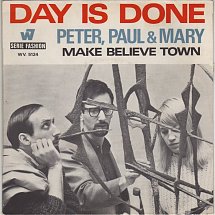 W
W"Day Is Done" is a song written by Peter Yarrow. It was recorded by Yarrow's group Peter, Paul and Mary and released as a single in 1969. It was one of the anti-war protest songs of the Vietnam War era. The song reached No. 21 on Billboard Hot 100, and was ranked No. 48 on the Billboard year-end Top Easy Listening Singles chart of 1969.
 W
W"Le Déserteur" is a famous anti-war song written by the French poet and musician Boris Vian. It was first performed on the day of the decisive French defeat in the First Indochina War on May 7, 1954.
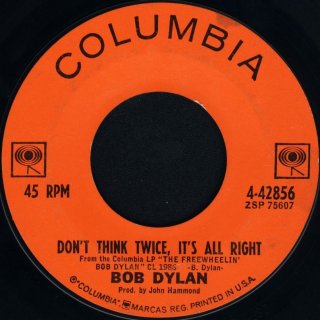 W
W"Don't Think Twice, It's All Right" is a song written by Bob Dylan in 1962, recorded on November 14 that year, and released on the 1963 album The Freewheelin' Bob Dylan and as a single.
 W
W"The First Time Ever I Saw Your Face" is a 1957 folk song written by Scottish political singer/songwriter Ewan MacColl for Peggy Seeger, who later became his wife. At the time, the couple were lovers, although MacColl was still married to his second wife, Jean Newlove. Seeger sang the song when the duo performed in folk clubs around Britain. During the 1960s, it was recorded by various folk singers and became a major international hit for Roberta Flack in 1972, winning Grammy Awards for Record of the Year and Song of the Year. Billboard ranked it as the number one Hot 100 single of the year for 1972.
 W
W"Forever Young" is a song by Bob Dylan, recorded in California in November 1973. The song first appeared on Dylan's fourteenth studio album Planet Waves (1974).
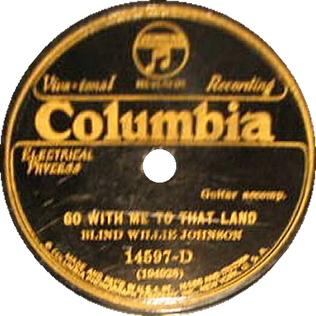 W
W"Go with Me to That Land" or "Come and Go with Me " is a traditional gospel blues song recorded on April 20, 1930 by Blind Willie Johnson with backing vocals by Willie B. Harris, who may have been his first wife. It was released as a single on Columbia 14597-D, backed with "Everybody Ought to Treat a Stranger Right".
 W
W"Goodnight, Irene" or "Irene, Goodnight," is a 20th-century American folk standard, written in 34 time, first recorded by American blues musician Huddie 'Lead Belly' Ledbetter in 1933.
"How Can I Keep From Singing?" is an American folksong originally composed as a Christian hymn by American Baptist minister Robert Lowry. The song is frequently, though erroneously, cited as a traditional Quaker or Shaker hymn. The original composition has now entered into the public domain, and appears in several hymnals and song collections, both in its original form and with a revised text that omits most of the explicitly Christian content and adds a verse about solidarity in the face of oppression. Though it was not originally a Quaker hymn, Quakers adopted it as their own in the twentieth century and use it widely today.
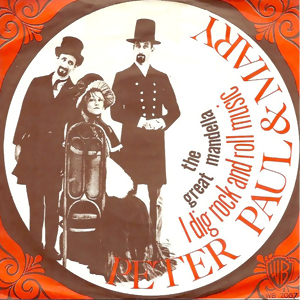 W
W"I Dig Rock and Roll Music" is a 1967 song by the American folk group Peter, Paul and Mary, written by Paul Stookey, James Mason and Dave Dixon.
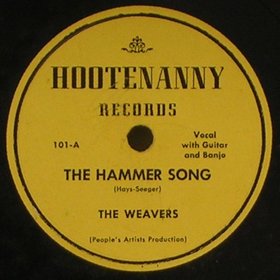 W
W"If I Had a Hammer " is a protest song written by Pete Seeger and Lee Hays. It was written in 1949 in support of the Progressive movement, and was first recorded by the Weavers, a folk music quartet composed of Seeger, Hays, Ronnie Gilbert, and Fred Hellerman. It was a #10 hit for Peter, Paul and Mary in 1962 and then went to #3 a year later when recorded by Trini Lopez in 1963.
 W
W"It Ain't Me Babe" is a song by Bob Dylan that originally appeared on his fourth album Another Side of Bob Dylan, which was released in 1964 by Columbia Records. According to music critic Oliver Trager, this song, along with others on the album, marked a departure for Dylan as he began to explore the possibilities of language and deeper levels of the human experience. Within a year of its release, the song was picked up as a single by folk rock act the Turtles and country artist Johnny Cash.
 W
W"Kisses Sweeter Than Wine" is a popular song, with lyrics written and music adapted in 1950 by Pete Seeger and Lee Hays of The Weavers, and recorded by Jimmie Rodgers. The tune was adapted from Lead Belly's "If It Wasn't for Dicky" (1937), which in turn was adapted from the traditional Irish folk tune "Drimindown / Drumion Dubh". The Weavers first released the song in 1951 as a Decca single, which reached number 19 on the Billboard chart and number 20 on the Cashbox chart in 1951.
 W
W"Leaving on a Jet Plane" is a song written and recorded by singer-songwriter John Denver in 1966, originally included on his debut demo recording John Denver Sings as "Babe I Hate To Go". He made several copies and gave them out as presents for Christmas of that year. Denver's then producer Milt Okun convinced him to change the title and was renamed "Leaving on a Jet Plane" in 1967.
 W
W"Michael, Row the Boat Ashore" is an African-American spiritual first noted during the American Civil War at St. Helena Island, one of the Sea Islands of South Carolina. The best-known recording was released in 1960 by the U.S. folk band The Highwaymen; that version briefly reached number-one hit status as a single.
 W
W"Nobody Knows You When You're Down and Out" is a blues standard written by pianist Jimmie Cox in 1923 and originally performed in a Vaudeville-blues style. The lyrics in the popular 1929 recording by Bessie Smith are told from the point of view of somebody who was once wealthy during the Prohibition era and reflect on the fleeting nature of material wealth and the friendships that come and go with it. Since her 1929 recording, the song has been interpreted by numerous musicians in a variety of styles.
 W
W"Puff, the Magic Dragon" is a song written by Peter Yarrow of Peter, Paul and Mary from a poem by Leonard Lipton. It was made popular by Yarrow's group in a 1962 recording released in January 1963.
 W
W"The Rising of the Moon" is an Irish ballad recounting a battle between the United Irishmen, led by Theobald Wolfe Tone and the British Army during the Irish Rebellion of 1798.
 W
W"Sinner Man" or "Sinnerman" is a song written by Will Holt, an American from Portland, Maine, and popularized in both caucasian and African American cultures, where it has become a traditional spiritual song. It has been recorded by a number of performers and has been incorporated in many other of the media and arts. The lyrics describe a sinner attempting to hide from divine justice on Judgment Day. It was recorded in the 1950s by Les Baxter, the Swan Silvertones, the Weavers and others, before Nina Simone recorded an extended version in 1965.
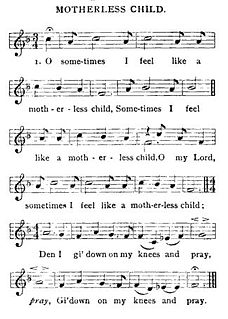 W
W"Sometimes I Feel Like a Motherless Child", also "Motherless Child", is a traditional Negro spiritual. It dates back to the era of slavery in the United States. An early performance of the song dates back to the 1870s by the Fisk Jubilee Singers. Commonly heard during the Civil rights movement in the United States, it has many variations and has been recorded widely.
 W
W"This Land Is Your Land" is one of the United States' most famous folk songs. Its lyrics were written by American folk singer Woody Guthrie in 1940, based on an existing melody, a Carter Family tune called "When the World's on Fire", in critical response to Irving Berlin's "God Bless America". When Guthrie was tired of hearing Kate Smith sing "God Bless America" on the radio in the late 1930s, he sarcastically called his song "God Blessed America for Me" before renaming it "This Land Is Your Land".
 W
W"We Shall Overcome" is a gospel song which became a protest song and a key anthem of the American civil rights movement. The song is most commonly attributed as being lyrically descended from "I'll Overcome Some Day", a hymn by Charles Albert Tindley that was first published in 1901.
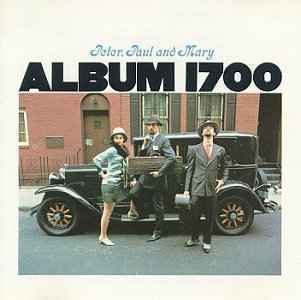 W
WAlbum 1700 is the seventh studio album by American folk music trio Peter, Paul and Mary, released in 1967. It produced the band's most successful and final hit, a cover of the John Denver composition "Leaving on a Jet Plane". The album peaked at number 15 on Billboard magazine's Top LP chart and was nominated for a Grammy Award in the Best Folk Performance category. Album 1700 was so named because its original LP issue was Warner Bros. Records catalog number W-1700 for the mono version and WS-1700 for the stereo version. It stayed on the charts and rose again in 1969, thanks to the single release of "Leaving on a Jet Plane".
 W
W"Where Have All the Flowers Gone?" is a modern folk-style song. The melody and the first three verses were written by Pete Seeger in 1955 and published in Sing Out! magazine. Additional verses were added in May 1960 by Joe Hickerson, who turned it into a circular song. Its rhetorical "where?" and meditation on death place the song in the ubi sunt tradition. In 2010, the New Statesman listed it as one of the "Top 20 Political Songs".